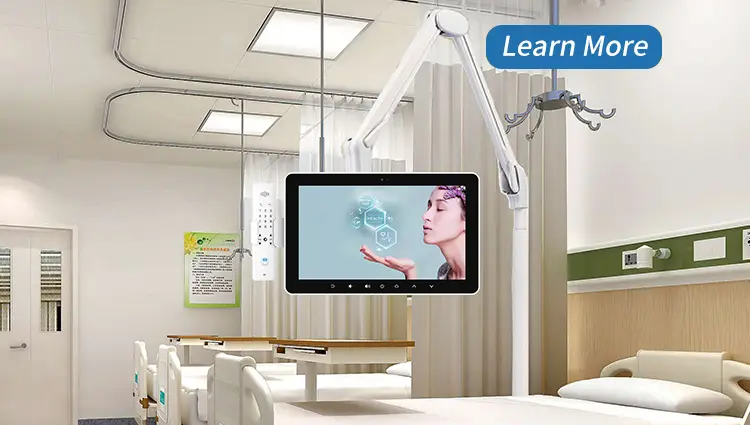A patient infotainment terminal, also known as a bedside infotainment terminal, is a device designed for use in healthcare settings that provides patients with entertainment, information, and communication tools, while also offering healthcare staff access to patient data.
Here’s a more detailed breakdown:
- Purpose:
- Patient Entertainment: These terminals allow patients to watch TV, listen to music, browse the internet, and engage with social media.
- Patient Education: They can provide access to information about their treatment, medications, and hospital services.
- Communication: Patients can use them to communicate with loved ones through video calls or messaging.
- Staff Access to Data: Healthcare staff can use the terminals to access patient records, order meals, and manage patient needs.
- Features:
- Touchscreen Display: Intuitive touchscreens are common for easy navigation.
- Anti-Bacterial Housing: Designed for healthcare environments, often with materials that resist bacterial growth.
- Connectivity: Features like Wi-Fi, VoIP phones, and cameras for video calls.
- Mobility: Some models are designed to be mobile, allowing them to be moved to different patient rooms.
- Integration with other systems: Can be integrated with hospital systems for patient data access and communication.
- Benefits:
- Improved Patient Experience: Entertainment and access to information can help reduce anxiety and improve patient satisfaction.
- Enhanced Communication: Facilitates communication between patients, staff, and family members.
- Increased Efficiency: Streamlines tasks for healthcare staff, such as ordering meals or accessing patient information.
- Data Security: Secure access to patient data for authorized personnel.
- Examples of Applications:
- Patient Education: Displaying information about procedures, medications, or hospital policies.
- Entertainment: Providing access to movies, TV shows, and music.
- Communication: Enabling video calls with family and friends.
- Hospital Navigation: Providing directions to different departments.
- Meal Ordering: Allowing patients to order food from the hospital cafeteria.
- Access to Electronic Health Records: Allowing authorized staff to view patient data.
what is gmc infotainment system?
The GMC infotainment system is a central digital hub that allows drivers to control various vehicle functions, connect with devices like smartphones, and access entertainment and information features, often through a touchscreen interface.
Here’s a more detailed breakdown:
- Functionality:The system enables access to features like:
- Navigation: Built-in or smartphone-integrated navigation apps.
- Entertainment: Audio streaming, podcasts, and other media apps.
- Connectivity: Bluetooth, Apple CarPlay, Android Auto, and Wi-Fi connectivity.
- Vehicle Controls: Climate control, phone integration, and other vehicle settings.
- Voice Control: Integration with voice assistants like Google Assistant and Amazon Alexa.
- Apps: Access to a variety of in-vehicle apps, depending on the vehicle model and subscription.
- User Interface:GMC infotainment systems are designed to be intuitive and easy to use, often mirroring smartphone interfaces.
- Customization:Users can personalize their experience by adding favorite contacts, songs, and apps to quick-access menus.
- Rear-Seat Infotainment:GMC offers optional rear-seat infotainment systems with DVD players, wireless headphones, and multiple input options.
- Google Built-In:Some GMC models feature Google Built-in, which provides access to Google Maps, Google Play, and Google Assistant.

